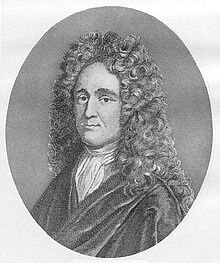André Dacier
André Dacier | |
|---|---|
 | |
| Born | 1645 |
| Died | 18 September 1722 (aged 76–77) Paris, France |
| Nationality | French |
| Occupation(s) | Classical scholar and editor of texts |
| Spouse | Anne Dacier |
André Dacier (Latin: Andreas Dacerius; 6 April 1651 – 18 September 1722) was a French classical scholar and editor of texts. He began his career with an edition and commentary of Festus's De verborum significatione, and was the first to produce a "readable" text of the 20-book work.[1] His wife was the influential classical scholar and translator, Anne Dacier.[2][3]
Life and career
[edit]Dacier was born at Castres in upper Languedoc. His father, a Protestant lawyer, sent him first to the Academy of Puy Laurens, and afterwards to the Academy of Saumur to study under Tanneguy Le Fèvre here he converted to Catholicism and remained a devout Catholic for the rest of his life. On Lefebvre's death in 1672, Dacier moved to Paris, and was appointed an editors of the Delphin Classics series. In 1683 he married Anne Lefèvre, the daughter of his old tutor.[4] Better known by her married name of Madame Dacier, her work as a classicist has been acknowledged by encyclopedia editors to be far superior to his.[2][3]
In 1695 he was elected to the Academy of Inscriptions, and also to the Académie française; not long after this, as payment for his share in the medallic history of the king's reign, he was appointed keeper of the library of the Louvre. He died two years after his wife.[4]
Work
[edit]The most important of Dacier's works were his editions of Pompeius Festus and Verrius Flaccus, and his translations of Horace (with notes),[5] Aristotle's Poetics, the Electra and Oedipus the King of Sophocles; Epictetus, Hippocrates and Plutarch's Lives.[4]
Dacier and his wife Anne together translated Meditations by Marcus Aurelius into French in 1690–91, as well as writing an extensive commentary on the work.
In editing Festus, Dacier worked from the proposals of Joseph Scaliger, who provided notes and additions. His stated goal was to produce a "clear and educationally useful text." Addressing his work to the Dauphin (in usum Delphini), at that time Louis, he was more interested in the realia of Roman law, treaties, and the foundations of power than in the literary quality of the text or its lack thereof. Dacier's work on Festus was first published in Paris, 1681, with subsequent editions in 1692, 1699, and 1700.[1]
References
[edit]- "André Dacier" (in French). Académie française. Retrieved 3 December 2016.
Notes
[edit]- ^ a b Fragmenta Selecta Antiquarian Booksellers, citing Martine Furno, La collection Ad usum Delphini (ELLUG, 2005), vol. 2, pp. 263–272.
- ^ a b "Anne Dacier French Scholar and Translator-Britannica.com". Encyclopedia Britannica. Retrieved 24 November 2017.
- ^ a b "Dacier, Anne Le Fevre – Internet Encyclopedia of Philosophy". Internet Encyclopedia of Philosophy. Archived from the original on 28 June 2010. Retrieved 24 November 2017.
- ^ a b c One or more of the preceding sentences incorporates text from a publication now in the public domain: Chisholm, Hugh, ed. (1911). "Dacier, André". Encyclopædia Britannica. Vol. 7 (11th ed.). Cambridge University Press. pp. 727–728. This cites:
- C. A. Sainte-Beuve, Causeries du lundi, vol. ix.
- J. F. Bodin, Recherches historiques sur la ville de Saumur (1812–1814)
- P. J. Burette, Éloge de Mme Dacier (1721)
- Mémoires de Mme de Staël (1755)
- E. Egger, L'Hellénisme en France, ii. (1869)
- Mémoires de Saint-Simon, iii.
- H. Rigault, Histoire de la querelle des anciens et des modernes (1856).
- ^ See, for example: Horace (1691). Les Oeuvres d'Horace. Translated by Dacier, André (2 ed.). Paris: Denys Thierry; and Claude Barbin. 10 volumes.
External links
[edit]- Encyclopædia Britannica Andre Dacier
- Works by André Dacier at Project Gutenberg
- Works by or about André Dacier at the Internet Archive


 French
French Deutsch
Deutsch